上海交通大学:《莎士比亚戏剧赏析》课程教学资源_Romeo and Juliet_Romeo and Juliet

Romeo and Juliet Shakespeare,William,1564-1616 Clark,William George,1821-1878;William Aldis Wright,1831-1914 Creation of machine-readable version:Grady Ward,Moby Lexical Project Conversion to TEI.2-conformant markup:University of Virginia Library Electronic Text Center.ca.205 kilobytes This version available from the University of Virginia Library Charlottesville,Virginia Publicly accessible http://etext.lib.virginia.edu/modeng/modengS.browse.html 1998 Note:We have been unable to verify conclusively the exact source of this electronic text,but we believe it to be "The Globe Edition"of the Works of William Shakespeare edited by William George Clark and William Aldis Wright.Error checking was done against the 1866 edition noted in the "Source Description"field. These texts are public domain. About the print version Romeo and Juliet Shakespeare,William,1564-1616 Clark,William George,1821-1878;William Aldis Wright,1831-1914 The Globe Edition vii,1075p.18cm. MacMillan and Co. Cambridge 1866 Print copy consulted:UVa Library,PR2753 .C6 1866 Prepared for the University of Virginia Library Electronic Text Center. Published:1595-1596
Romeo and Juliet Shakespeare, William, 1564-1616 Clark, William George, 1821-1878; William Aldis Wright, 1831-1914 Creation of machine-readable version: Grady Ward, Moby Lexical Project Conversion to TEI.2-conformant markup: University of Virginia Library Electronic Text Center. ca. 205 kilobytes This version available from the University of Virginia Library Charlottesville, Virginia Publicly accessible http://etext.lib.virginia.edu/modeng/modengS.browse.html 1998 Note: We have been unable to verify conclusively the exact source of this electronic text, but we believe it to be "The Globe Edition" of the Works of William Shakespeare edited by William George Clark and William Aldis Wright. Error checking was done against the 1866 edition noted in the "Source Description" field. These texts are public domain. About the print version Romeo and Juliet Shakespeare, William, 1564-1616 Clark, William George, 1821-1878; William Aldis Wright, 1831-1914 The Globe Edition viii, 1075 p. 18 cm. MacMillan and Co. Cambridge 1866 Print copy consulted: UVa Library, PR2753 .C6 1866 Prepared for the University of Virginia Library Electronic Text Center. Published: 1595-1596
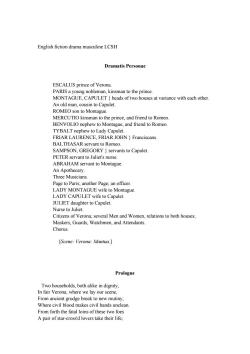
English fiction drama masculine LCSH Dramatis Personae ESCALUS prince of Verona. PARIS a young nobleman,kinsman to the prince. MONTAGUE,CAPULET heads of two houses at variance with each other. An old man,cousin to Capulet. ROMEO son to Montague. MERCUTIO kinsman to the prince,and friend to Romeo. BENVOLIO nephew to Montague,and friend to Romeo. TYBALT nephew to Lady Capulet. FRIAR LAURENCE,FRIAR JOHN Franciscans BALTHASAR servant to Romeo. SAMPSON,GREGORY servants to Capulet PETER servant to Juliet's nurse. ABRAHAM servant to Montague. An Apothecary. Three Musicians. Page to Paris;another Page;an officer. LADY MONTAGUE wife to Montague. LADY CAPULET wife to Capulet. JULIET daughter to Capulet. Nurse to Juliet. Citizens of Verona;several Men and Women,relations to both houses; Maskers,Guards,Watchmen,and Attendants. Chorus. [Scene:Verona:Mantua.] Prologue Two households,both alike in dignity, In fair Verona,where we lay our scene, From ancient grudge break to new mutiny, Where civil blood makes civil hands unclean. From forth the fatal loins of these two foes A pair of star-cross'd lovers take their life;
English fiction drama masculine LCSH Dramatis Personae ESCALUS prince of Verona. PARIS a young nobleman, kinsman to the prince. MONTAGUE, CAPULET } heads of two houses at variance with each other. An old man, cousin to Capulet. ROMEO son to Montague. MERCUTIO kinsman to the prince, and friend to Romeo. BENVOLIO nephew to Montague, and friend to Romeo. TYBALT nephew to Lady Capulet. FRIAR LAURENCE, FRIAR JOHN } Franciscans. BALTHASAR servant to Romeo. SAMPSON, GREGORY } servants to Capulet. PETER servant to Juliet's nurse. ABRAHAM servant to Montague. An Apothecary. Three Musicians. Page to Paris; another Page; an officer. LADY MONTAGUE wife to Montague. LADY CAPULET wife to Capulet. JULIET daughter to Capulet. Nurse to Juliet. Citizens of Verona; several Men and Women, relations to both houses; Maskers, Guards, Watchmen, and Attendants. Chorus. [Scene: Verona: Mantua.] Prologue Two households, both alike in dignity, In fair Verona, where we lay our scene, From ancient grudge break to new mutiny, Where civil blood makes civil hands unclean. From forth the fatal loins of these two foes A pair of star-cross'd lovers take their life;

Whose misadventured piteous overthrows Do with their death bury their parents'strife. The fearful passage of their death-mark'd love, And the continuance of their parents'rage, Which,but their children's end,nought could remove, Is now the two hours'traffic of our stage; The which if you with patient ears attend, What here shall miss,our toil shall strive to mend. Act1 Scene 1 [Verona.A public place.] [Enter SAMPSON and GREGORY,of the house of Capulet,armed with swords and bucklers] SAMPSON Gregory,o'my word,we'll not carry coals. GREGORY No,for then we should be colliers. SAMPSON I mean,an we be in choler,we'll draw. GREGORY Ay,while you live,draw your neck out o'the collar. SAMPSON I strike quickly,being moved
Whose misadventured piteous overthrows Do with their death bury their parents' strife. The fearful passage of their death-mark'd love, And the continuance of their parents' rage, Which, but their children's end, nought could remove, Is now the two hours' traffic of our stage; The which if you with patient ears attend, What here shall miss, our toil shall strive to mend. Act 1 Scene 1 [Verona. A public place.] [Enter SAMPSON and GREGORY, of the house of Capulet, armed with swords and bucklers] SAMPSON Gregory, o' my word, we'll not carry coals. GREGORY No, for then we should be colliers. SAMPSON I mean, an we be in choler, we'll draw. GREGORY Ay, while you live, draw your neck out o' the collar. SAMPSON I strike quickly, being moved
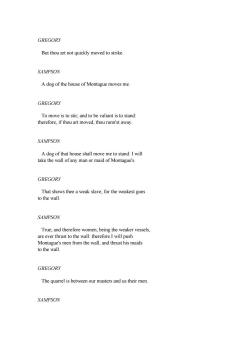
GREGORY But thou art not quickly moved to strike. SAMPSON A dog of the house of Montague moves me. GREGORY To move is to stir;and to be valiant is to stand: therefore,if thou art moved,thou runn'st away. SAMPSON A dog of that house shall move me to stand:I will take the wall of any man or maid of Montague's. GREGORY That shows thee a weak slave;for the weakest goes to the wall. SAMPSON True;and therefore women,being the weaker vessels, are ever thrust to the wall:therefore I will push Montague's men from the wall,and thrust his maids to the wall. GREGORY The quarrel is between our masters and us their men. SAMPSON
GREGORY But thou art not quickly moved to strike. SAMPSON A dog of the house of Montague moves me. GREGORY To move is to stir; and to be valiant is to stand: therefore, if thou art moved, thou runn'st away. SAMPSON A dog of that house shall move me to stand: I will take the wall of any man or maid of Montague's. GREGORY That shows thee a weak slave; for the weakest goes to the wall. SAMPSON True; and therefore women, being the weaker vessels, are ever thrust to the wall: therefore I will push Montague's men from the wall, and thrust his maids to the wall. GREGORY The quarrel is between our masters and us their men. SAMPSON
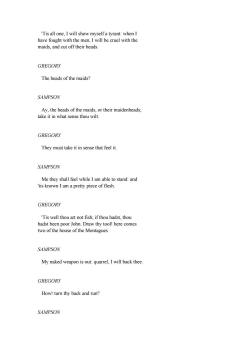
'Tis all one,I will show myself a tyrant:when I have fought with the men,I will be cruel with the maids,and cut off their heads. GREGORY The heads of the maids? SAMPSON Ay,the heads of the maids,or their maidenheads; take it in what sense thou wilt. GREGORY They must take it in sense that feel it. SAMPSON Me they shall feel while I am able to stand:and 'tis known I am a pretty piece of flesh. GREGORY 'Tis well thou art not fish;if thou hadst,thou hadst been poor John.Draw thy tool!here comes two of the house of the Montagues. SAMPSON My naked weapon is out:quarrel,I will back thee. GREGORY How!turn thy back and run? SAMPSON
'Tis all one, I will show myself a tyrant: when I have fought with the men, I will be cruel with the maids, and cut off their heads. GREGORY The heads of the maids? SAMPSON Ay, the heads of the maids, or their maidenheads; take it in what sense thou wilt. GREGORY They must take it in sense that feel it. SAMPSON Me they shall feel while I am able to stand: and 'tis known I am a pretty piece of flesh. GREGORY 'Tis well thou art not fish; if thou hadst, thou hadst been poor John. Draw thy tool! here comes two of the house of the Montagues. SAMPSON My naked weapon is out: quarrel, I will back thee. GREGORY How! turn thy back and run? SAMPSON
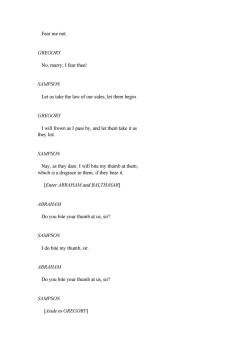
Fear me not. GREGORY No,marry,I fear thee! SAMPSON Let us take the law of our sides;let them begin. GREGORY I will frown as I pass by,and let them take it as they list. SAMPSON Nay,as they dare.I will bite my thumb at them; which is a disgrace to them,if they bear it. [Enter ABRAHAM and BALTHASAR] ABRAHAM Do you bite your thumb at us,sir? SAMPSON I do bite my thumb,sir. ABRAHAM Do you bite your thumb at us,sir? SAMPSON [Aside to GREGORY]
Fear me not. GREGORY No, marry; I fear thee! SAMPSON Let us take the law of our sides; let them begin. GREGORY I will frown as I pass by, and let them take it as they list. SAMPSON Nay, as they dare. I will bite my thumb at them; which is a disgrace to them, if they bear it. [Enter ABRAHAM and BALTHASAR] ABRAHAM Do you bite your thumb at us, sir? SAMPSON I do bite my thumb, sir. ABRAHAM Do you bite your thumb at us, sir? SAMPSON [Aside to GREGORY]
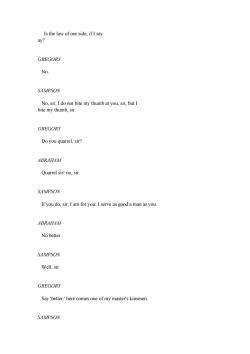
Is the law of our side,if I say ay? GREGORY No. SAMPSON No,sir,I do not bite my thumb at you,sir,but I bite my thumb,sir. GREGORY Do you quarrel,sir? ABRAHAM Quarrel sir!no,sir. SAMPSON If you do,sir,I am for you:I serve as good a man as you. ABRAHAM No better. SAMPSON Well,sir. GREGORY Say 'better:'here comes one of my master's kinsmen. SAMPSON
Is the law of our side, if I say ay? GREGORY No. SAMPSON No, sir, I do not bite my thumb at you, sir, but I bite my thumb, sir. GREGORY Do you quarrel, sir? ABRAHAM Quarrel sir! no, sir. SAMPSON If you do, sir, I am for you: I serve as good a man as you. ABRAHAM No better. SAMPSON Well, sir. GREGORY Say 'better:' here comes one of my master's kinsmen. SAMPSON
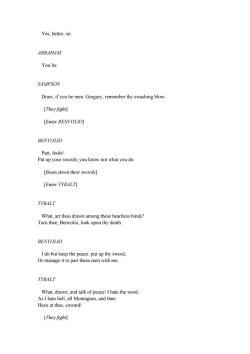
Yes,better,sir. ABRAHAM You lie. SAMPSON Draw,if you be men.Gregory,remember thy swashing blow. [They fight] [Enter BENVOLIO] BENVOLIO Part,fools! Put up your swords;you know not what you do. [Beats down their swords] [Enter TYBALT] TYBALT What,art thou drawn among these heartless hinds? Turn thee,Benvolio,look upon thy death. BENVOLIO I do but keep the peace:put up thy sword, Or manage it to part these men with me. TYBALT What,drawn,and talk of peace!I hate the word, As I hate hell,all Montagues,and thee: Have at thee,coward! [They fight]
Yes, better, sir. ABRAHAM You lie. SAMPSON Draw, if you be men. Gregory, remember thy swashing blow. [They fight] [Enter BENVOLIO] BENVOLIO Part, fools! Put up your swords; you know not what you do. [Beats down their swords] [Enter TYBALT] TYBALT What, art thou drawn among these heartless hinds? Turn thee, Benvolio, look upon thy death. BENVOLIO I do but keep the peace: put up thy sword, Or manage it to part these men with me. TYBALT What, drawn, and talk of peace! I hate the word, As I hate hell, all Montagues, and thee: Have at thee, coward! [They fight]
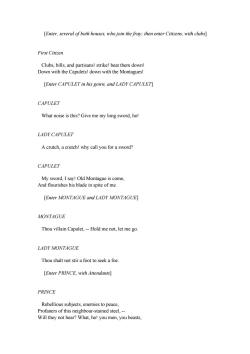
[Enter,several of both houses,who join the fray;then enter Citizens,with clubs] First Citizen Clubs,bills,and partisans!strike!beat them down! Down with the Capulets!down with the Montagues! [Enter CAPULET in his gown,and LADY CAPULET] CAPULET What noise is this?Give me my long sword,ho! LADY CAPULET A crutch,a crutch!why call you for a sword? CAPULET My sword,I say!Old Montague is come, And flourishes his blade in spite of me. [Enter MONTAGUE and LADY MONTAGUE] MONTAGUE Thou villain Capulet,--Hold me not,let me go LADY MONTAGUE Thou shalt not stir a foot to seek a foe. [Enter PRINCE,with Attendants] PRINCE Rebellious subjects,enemies to peace, Profaners of this neighbour-stained steel,-- Will they not hear?What,ho!you men,you beasts
[Enter, several of both houses, who join the fray; then enter Citizens, with clubs] First Citizen Clubs, bills, and partisans! strike! beat them down! Down with the Capulets! down with the Montagues! [Enter CAPULET in his gown, and LADY CAPULET] CAPULET What noise is this? Give me my long sword, ho! LADY CAPULET A crutch, a crutch! why call you for a sword? CAPULET My sword, I say! Old Montague is come, And flourishes his blade in spite of me. [Enter MONTAGUE and LADY MONTAGUE] MONTAGUE Thou villain Capulet, -- Hold me not, let me go. LADY MONTAGUE Thou shalt not stir a foot to seek a foe. [Enter PRINCE, with Attendants] PRINCE Rebellious subjects, enemies to peace, Profaners of this neighbour-stained steel, -- Will they not hear? What, ho! you men, you beasts
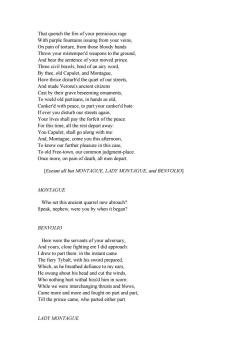
That quench the fire of your pernicious rage With purple fountains issuing from your veins, On pain of torture,from those bloody hands Throw your mistemper'd weapons to the ground, And hear the sentence of your moved prince. Three civil brawls,bred of an airy word, By thee,old Capulet,and Montague, Have thrice disturb'd the quiet of our streets, And made Verona's ancient citizens Cast by their grave beseeming ornaments, To wield old partisans,in hands as old, Canker'd with peace,to part your canker'd hate: If ever you disturb our streets again, Your lives shall pay the forfeit of the peace. For this time,all the rest depart away: You Capulet;shall go along with me: And,Montague,come you this afternoon, To know our further pleasure in this case, To old Free-town,our common judgment-place. Once more,on pain of death,all men depart. [Exeunt all but MONTAGUE,LADY MONTAGUE,and BENVOLIO] MONTAGUE Who set this ancient quarrel new abroach? Speak,nephew,were you by when it began? BENVOLIO Here were the servants of your adversary, And yours,close fighting ere I did approach: I drew to part them:in the instant came The fiery Tybalt,with his sword prepared, Which,as he breathed defiance to my ears, He swung about his head and cut the winds, Who nothing hurt withal hiss'd him in scorn: While we were interchanging thrusts and blows, Came more and more and fought on part and part, Till the prince came,who parted either part. LADY MONTAGUE
That quench the fire of your pernicious rage With purple fountains issuing from your veins, On pain of torture, from those bloody hands Throw your mistemper'd weapons to the ground, And hear the sentence of your moved prince. Three civil brawls, bred of an airy word, By thee, old Capulet, and Montague, Have thrice disturb'd the quiet of our streets, And made Verona's ancient citizens Cast by their grave beseeming ornaments, To wield old partisans, in hands as old, Canker'd with peace, to part your canker'd hate: If ever you disturb our streets again, Your lives shall pay the forfeit of the peace. For this time, all the rest depart away: You Capulet; shall go along with me: And, Montague, come you this afternoon, To know our further pleasure in this case, To old Free-town, our common judgment-place. Once more, on pain of death, all men depart. [Exeunt all but MONTAGUE, LADY MONTAGUE, and BENVOLIO] MONTAGUE Who set this ancient quarrel new abroach? Speak, nephew, were you by when it began? BENVOLIO Here were the servants of your adversary, And yours, close fighting ere I did approach: I drew to part them: in the instant came The fiery Tybalt, with his sword prepared, Which, as he breathed defiance to my ears, He swung about his head and cut the winds, Who nothing hurt withal hiss'd him in scorn: While we were interchanging thrusts and blows, Came more and more and fought on part and part, Till the prince came, who parted either part. LADY MONTAGUE
按次数下载不扣除下载券;
注册用户24小时内重复下载只扣除一次;
顺序:VIP每日次数-->可用次数-->下载券;
- 上海交通大学:《莎士比亚戏剧赏析》课程教学资源_Romeo and Juliet_R&J(in-class).doc
- 上海交通大学:《莎士比亚戏剧赏析》课程教学资源_Midsummer N D_仲夏夜之梦.doc
- 上海交通大学:《莎士比亚戏剧赏析》课程教学资源_Midsummer N D_Midsummernightsdream.doc
- 上海交通大学:《莎士比亚戏剧赏析》课程教学资源_Midsummer N D_MidsummerNightDream(节选).doc
- 上海交通大学:《莎士比亚戏剧赏析》课程教学资源_Merchant of V_威尼斯商人.doc
- 上海交通大学:《莎士比亚戏剧赏析》课程教学资源_Merchant of V_威尼斯商人 students.doc
- 上海交通大学:《莎士比亚戏剧赏析》课程教学资源_Merchant of V_Merchant of Venice.doc
- 上海交通大学:《莎士比亚戏剧赏析》课程教学资源_Macbeth_麦克白.doc
- 上海交通大学:《莎士比亚戏剧赏析》课程教学资源_Macbeth_Macbeth.doc
- 上海交通大学:《莎士比亚戏剧赏析》课程教学资源_Macbeth_Macbeth(in-class).doc
- 上海交通大学:《莎士比亚戏剧赏析》课程教学资源_KingLear_李尔王.docx
- 上海交通大学:《莎士比亚戏剧赏析》课程教学资源_KingLear_KingLear.docx
- 上海交通大学:《莎士比亚戏剧赏析》课程教学资源_KingLear_KingLear-class.docx
- 上海交通大学:《莎士比亚戏剧赏析》课程教学资源_Hamlet_哈姆雷特.doc
- 上海交通大学:《莎士比亚戏剧赏析》课程教学资源_Hamlet_Hamlet全文(英).doc
- 上海交通大学:《莎士比亚戏剧赏析》课程教学资源_Antony and Cleopatra_安东尼与克莉奥佩特拉.docx
- 上海交通大学:《莎士比亚戏剧赏析》课程教学资源_Antony and Cleopatra_Antony&Cleopatra-student.docx
- 上海交通大学:《莎士比亚戏剧赏析》课程教学资源_Antony and Cleopatra_Antony and Cleopatra.docx
- 上海交通大学:《英语读写》课程教学资源(PPT)why the rich are getting richer.pptx
- 上海交通大学:《英语读写》课程教学资源(PPT)rhetoric.pptx
- 上海交通大学:《莎士比亚戏剧赏析》课程教学资源_Romeo and Juliet_罗密欧与朱丽叶.doc
- 上海交通大学:《莎士比亚戏剧赏析》课程教学资源_The Tempest_The Tempes-class.docx
- 上海交通大学:《莎士比亚戏剧赏析》课程教学资源_The Tempest_The Tempest.docx
- 上海交通大学:《莎士比亚戏剧赏析》课程教学资源_The Tempest_暴风雨.docx
- 上海交通大学:《莎士比亚戏剧赏析》课程教学资源_阅读书目_剧目译本目录.doc
- 上海交通大学:《古典诗词鉴赏与创作》教学资源(学生作品)天一阁小组_期末诗作试卷 毛维.doc
- 上海交通大学:《古典诗词鉴赏与创作》教学资源(学生作品)锦囊袋小组_五谷丰登.doc
- 北京大学:《大学语文》课程PPT教学课件(大学国文)第18单元 生活散文第三.ppt
- 《大学语文》课程教学资源(延伸阅读)《八十年代访谈录》(著:查建英).pdf
- 《大学语文》课程教学资源(延伸阅读)《极权的诱惑》THE TOTALITARIAN TEMPTATION(著:許知遠).pdf
- 《汉字文化》课程教学资源(经典阅读)古文字综合_古文字通典.pdf
- 《汉字文化》课程教学资源(经典阅读)汉字起源(文字起源)_文字孳乳考 杜学知 世界书局1975.pdf
- 上海交通大学:《莎士比亚戏剧赏析》课程教学资源_Hamlet_Hamlet(in-class).doc
- 上海交通大学:《历代名词人研究》课程教学资源(PPT讲义课件)第一讲 温庭筠、第二讲 李煜.ppt
- 上海交通大学:《历代名词人研究》课程教学资源(PPT讲义课件)第七讲 周邦彦、第八讲 李清照.ppt
- 上海交通大学:《历代名词人研究》课程教学资源(PPT讲义课件)第三讲 晏殊.ppt
- 上海交通大学:《历代名词人研究》课程教学资源(PPT讲义课件)第九讲 辛弃疾.ppt
- 上海交通大学:《历代名词人研究》课程教学资源(PPT讲义课件)第六讲 秦观.ppt
- 上海交通大学:《历代名词人研究》课程教学资源(PPT讲义课件)第十讲 姜夔、第十一讲 吴文英、第十二讲 纳兰性德.ppt
- 上海交通大学:《历代名词人研究》课程教学资源(PPT讲义课件)第四讲 柳永、第五讲 苏轼.ppt
